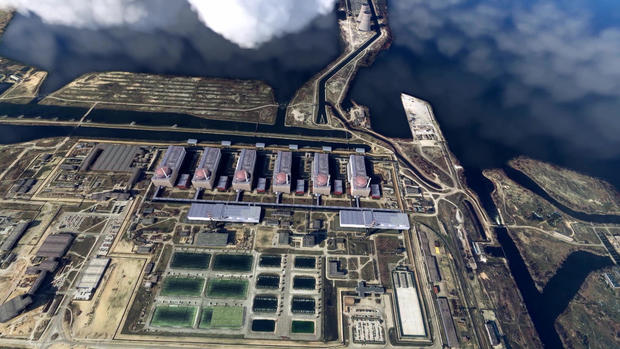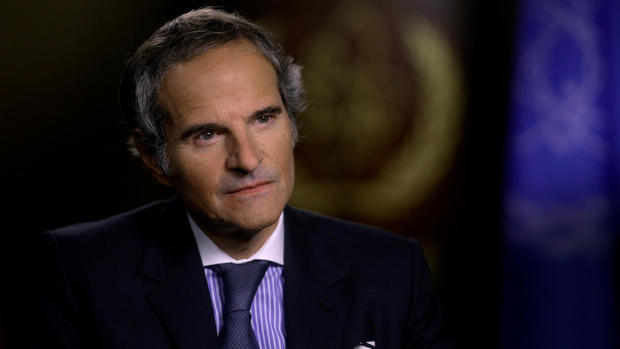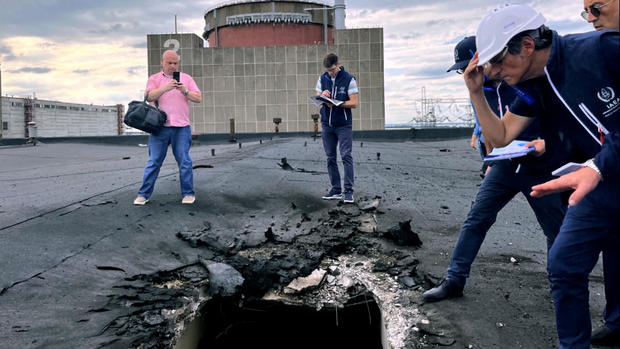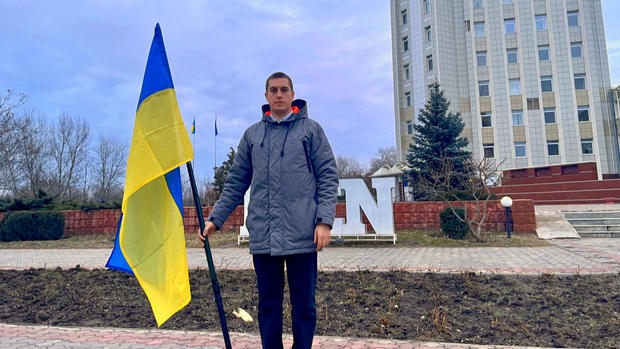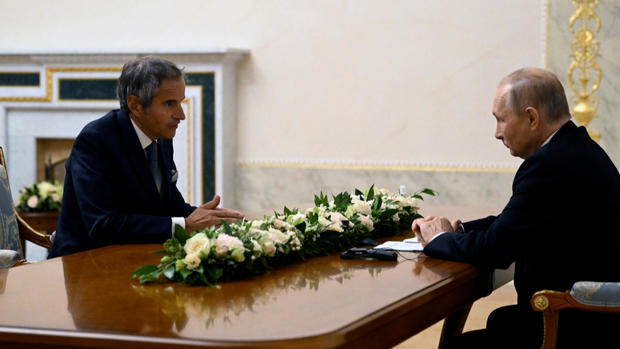IAEA head on preventing a nuclear disaster in Ukraine and around the world
Sixty years ago to the day, November 20th, the world sighed in relief as the Cuban Missile Crisis ended. It was the closest we ever came to nuclear armageddon – until now, with Russia threatening to use nuclear weapons in the war. And then, there’s the dire and deteriorating condition of Europe’s biggest nuclear power plant, Zaporizhzhia, in Russian-occupied Ukraine.
The situation is carefully monitored by the International Atomic Energy Agency in Vienna, the U.N.’s nuclear watchdog tasked with making sure nuclear facilities are safe and atomic material is used only for peaceful purposes.
Its director general, Rafael Mariano Grossi, recently inspected the site, which may be the most dangerous place in the world.
Lesley Stahl: So correct me if I’m wrong: Is this the first time a major power plant has been under fire in the middle of a war.
Rafael Mariano Grossi: Well, it’s an unprecedented thing, really, in so many ways. This place is at the front line which makes the whole thing so volatile and in need of an urgent action.
Zaporizhzhia has been shelled repeatedly since March, with both sides blaming each other. Before the war the plant supplied 20% of Ukraine’s power. It’s now largely idle, but the reactors still need to be constantly cooled down with circulating water. If they overheat it could lead to nuclear catastrophe within hours.
Getty Images
Lesley Stahl: The whole system is being cooled by electricity that’s coming in from the town, and there’s shelling. So what would happen if that electricity went down?
Rafael Mariano Grossi: What you have in that– in that situation is emergency systems that kick in. Like, diesel generators that you can have on a private property. And you don’t want the biggest nuclear power plant in Europe, one of the biggest in the world, to be cooled with– basically an emergency system which is dependent on fuel. Because when your diesels are out of whatever you put in it to make them work then what happens? Then you have a meltdown. Then you have a big radiological nuclear emergency or an accident, and this is what we are trying to prevent.
Lesley Stahl: So this situation is totally precarious.
Rafael Mariano Grossi: Totally. Until we have this plant protected, the possibility of the nuclear catastrophe is there.
Possibly dwarfing Chernobyl, a far smaller Ukrainian plant that famously blew up 36 years ago. In late August, after months of negotiating with both sides, Director General Grossi led his agency’s first mission into an active warzone, to inspect the stability of the site.
Rafael Mariano Grossi: And as we were approaching the last Ukrainian checkpoint, we started hearing– shooting– quite heavy shooting. Very close to us. So at that point– even the people at the checkpoint were running for shelter.
Lesley Stahl: Do you think that the convoy itself was a target?
Rafael Mariano Grossi: I think it was an– a clear attempt to stop us, to say, “Go home. This is not your place.”
But they proceeded. There were soldiers, tanks and armored trucks everywhere. The Russians are actually using the nuclear plant as their military base.
Lesley Stahl: When you went to visit, to inspect, you could go anywhere?
Rafael Mariano Grossi: Yes.
Lesley Stahl: You weren’t kept from–
Rafael Mariano Grossi: You know– yes, you know– we are the IAEA. We are known as the nuclear watchdog.
Lesley Stahl: Well, there are reports that you weren’t allowed into some crisis room there– into the control room. Is that not true?
Rafael Mariano Grossi: Well, there were areas that– where we were limited. But all the things we needed to see we could see.
Lesley Stahl: You didn’t want to see the control room?
Rafael Mariano Grossi: Yeah, we did want to see it. But for us, what is important is to be looking at the essential nuclear operation of the plant. And this we could see.
That included evidence that rockets had come dangerously close to the reactors and other sensitive areas.
Fredrik Dahl/IAEA
Rafael Mariano Grossi: I was on the– on the top of a building where they are… they are storing fresh fuel, the fuel that is going to go– into the– into the reactors. And–
Lesley Stahl: Nuclear fuel is what we’re–
Rafael Mariano Grossi: Nuclear fuel–
Lesley Stahl: –talking about–
Rafael Mariano Grossi: Nuclear fuel. And I– I could see very big holes out on– on that roof–
Lesley Stahl: On the roof?
Rafael Mariano Grossi: Yeah. At least two I saw, very, very big.
On a satellite photo he also pointed out the switchyard where the electricity comes in from the town.
Rafael Mariano Grossi: So this is where the external power comes to cool the reactors down. And this place was shelled several times, several times, which tells you that people knew exactly what they were doing.
Lesley Stahl: They were trying to cut off the power source.
Rafael Mariano Grossi: Here, here, here… exactly.
Shelling also destroyed one of the plant’s office buildings. These pictures were given to us by Andriy Tuz, a plant spokesman who fled Ukraine after working four months under Russian occupation.
Lesley Stahl: So tell us what that was like, working inside that plant, under Russian occupation from th–
Andriy Tuz: Yes. (SIGH) Russian troops take all our top manager with gun and they do only what Russian troops want.
Lesley Stahl: Did you feel like a hostage?
Andriy Tuz: Yes. Yes. I feel like I am prisoner in this nuclear power plant. I cannot say nothing because they go with gun.
There have been reports of imprisonments, kidnappings, and torture of Ukrainian employees. The head of the plant was detained. Andriy Tuz told us about the pressure one of the safety inspectors felt.
Andriy Tuz: It’s his work to go and check some pumps, how it work, how barometer, what pressure, what temperature. But he go and Russian tanks stay in front of him. It’s terrible. He cannot do his work. It’s to protect nuclear fuel, to control nuclear reaction.
Lesley Stahl: When you’re operating at a nuclear power plant and you’re under stress, and you’re worried, and you’re feeling threatened, doesn’t that lead to the possibility of human error?
Rafael Mariano Grossi: Of course. Yes.
Lesley Stahl: And the shelling goes on.
Rafael Mariano Grossi: And the shelling goes on. And this is why– we have been trying. I have been pushing– for the establishment of a protection zone. Which is basically don’t attack the plant.
He took his proposal to both President Zelensky in Kyiv and President Putin, in a one-on-one meeting last month in St. Petersburg.
Lesley Stahl: Interestingly, you sat very close to him, actually I think closer than you and I are right now.
Rafael Mariano Grossi: Maybe, yes.
Lesley Stahl: Would you say that he is familiar with what’s going on-
Rafael Mariano Grossi: Absolutely–
Lesley Stahl: –at this nuclear plant?
Rafael Mariano Grossi: He knows every detail of it, which was surprising to me.
Rafael Mariano Grossi: In my conversation with him, I could see that he had a very– detailed knowledge, not only of the layout of the– of the plant, but also, and very importantly, of the electrical– access, the external power source. So– and he–
Lesley Stahl: Where these things are being bombed?
Rafael Mariano Grossi: It is– it is a facility that he knows– that he knows very well.
Lesley Stahl: Is Mr. Putin trying to use this plant as a weapon? And we know that he’s weaponized energy in this war because of the way he’s used oil and gas. It just raises the question whether this plant is seen in his mind as a way to squeeze the Ukrainians. Someone said to us the other day, “You know, this is his dirty bomb, this plant.”
Rafael Mariano Grossi: Yeah, but if you protect it there’s no dirty bomb.
Getty Images
On Monday, the day we met Grossi, Presidents Joe Biden and Xi Jinping met in Bali and condemned Putin’s threat to use a nuclear weapon. And in Turkey, CIA Director William Burns warned his Russian counterpart of the consequences of such a move.
Lesley Stahl: Here we are talking about the possibility of a dirty bomb or a real bomb– I mean, this kind of idea of nuclear Armageddon because countries are now throwing the idea of using a nuclear weapon.
Rafael Mariano Grossi: Yes.
Lesley Stahl: They’re just throwing it up in the air.
Rafael Mariano Grossi: When you talk about using nuclear weapons as “You could this mortar or that Howitzer or that…” I mean this is a completely different ball game.
Lesley Stahl: So heads of state should not be throwing this around.
Rafael Mariano Grossi: They should not be doing that.
Rafael Grossi, at 61, has been working to prevent the proliferation of nukes for almost 4 decades. He’s seen here with his fellow argentinian, pope francis, and his children, 7 daughters and one son. We watched him coaching his son’s soccer team on a rare day off. He’s been particularly busy, given the number of rogue states suspected of developing a bomb.
Lesley Stahl: How close is Iran to making a nuclear bomb?
Rafael Mariano Grossi: At the current level of production of this enriched uranium, Iran has accumulated already enough material to have more than one device, if they chose to do that. But we don’t have any information that would indicate that Iran has a nuclear weapon program at the moment.
Lesley Stahl: Really?
Rafael Mariano Grossi: Really.
Lesley Stahl: So if I said to you, “Have we reached the point of no return with Iran? Is it time to just admit they’re a nuclear power?”
Rafael Mariano Grossi: No, we haven’t reached that point. But we need to work very hard so we don’t get there.
Director General Grossi is concerned about another country that has become a member of the nuclear club, North Korea, which is expected to conduct its first underground nuclear test since 2017. And that’s not the only issue on his plate in the Pacific.
Lesley Stahl: The Chinese are protesting the sale of eight nuclear submarines by the United States and Great Britain to Australia. The subs contain nuclear war material.
Lesley Stahl: Do you protest the sale?
Rafael Mariano Grossi: If they want to do this, they have to have a special arrangement with us.
Lesley Stahl: And does Australia have a special arrangement with you?
Rafael Mariano Grossi: We have started working on that, which means that we should be able to come to an agreement that would allow us to inspect this nuclear material in an appropriate way so that it is not diverted, used to make bombs.
Lesley Stahl: Do you think this agreement, if it should come to pass, would satisfy the Chinese? Have you talked to China?
Rafael Mariano Grossi: Well, China has a very firm position against this. They have been very critical of it. They have even been very critical of me.
Lesley Stahl: There’s this issue of a double standard. You know, if the sale was to Libya, the West would be screaming. And that it’s Australia, well, you know, they get a pass. Double standard question.
Rafael Mariano Grossi: Well, they may get their pass. They will not get mine until I have a satisfactory agreement.
Lesley Stahl: I want to go back to the nuclear power plant for one second, to Zaporizhzhia. When I realized that a nuclear power plant was under attack, my mind can’t even— calibrate what this means.
Rafael Mariano Grossi: It’s mind boggling, yeah, exactly. A demand for protection of the plant is very important. You don’t shell a nuclear power plant. You don’t storm a nuclear power plant.
Lesley Stahl: What about using a nuclear power plant as a military base?
Rafael Mariano Grossi: This is part of the agreement I have proposed.
Lesley Stahl: Yeah. But no one’s agreeing.
Rafael Mariano Grossi: They will.
Lesley Stahl: You think?
Rafael Mariano Grossi: I think.
Lesley Stahl: Are you — you’re always optimistic. This is you.
Rafael Mariano Grossi: I must– I must. Should I throw the towel? If I do that, can you imagine that? No.
Produced by Shachar Bar-On. Associate producer, Jinsol Jung. Broadcast associate, Wren Woodson. Edited by Peter M. Berman.
For all the latest Automobiles News Click Here
For the latest news and updates, follow us on Google News.


